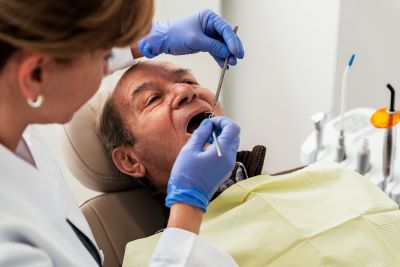Enter your email to receive the CareQuest newsletter:
December 18, 2023
Oral health is often viewed in isolation, yet its impact extends far beyond the mouth. Oral health can hurt the heart.
Emerging research has established a concerning link between oral health and heart issues. Gum disease, for example, can trigger cardiovascular problems and increase the risk of having a heart attack. Tooth decay and other oral infections in childhood can contribute to atherosclerosis (clogged arteries) in adulthood.

These risks can especially hurt older adults. A majority of seniors have a chronic illness, such as heart disease, which can worsen with poor oral health. However, millions of older adults can’t get needed dental care because Medicare doesn’t include oral health coverage.
Health industry leaders and policymakers can reduce the harms of dental and heart disease in many ways. How? First, let’s explore why oral health and hearth disease are connected.
Understanding the Link Between Oral Health and Heart Disease
Poor oral health, including gum disease, causes bacteria to grow in our mouths. These germs can enter our bloodstream and travel to other parts of our body, risking our systemic health in the process.
When bacteria from our mouth reaches our heart, they can cause inflammation. Oral bacteria has been linked to dangerous conditions affecting cardiovascular and brain health.
- Inflammation from dental bacteria can lead to infections of the heart lining, called endocarditis.
- Oral bacteria can lead to clogged arteries and heart attacks.
- Dental disease can also increase an adult’s risk of having a stroke.
While poor oral health may not be the sole cause of these threats, research shows other strong connections between our oral hygiene and heart health:
- People with gum disease are 28% more likely to suffer a heart attack than those without dental problems.
- Poor oral health is a risk factor for human papillomavirus (HPV) infection, which can make us more susceptible to having a heart attack.
Maintaining good oral health — and ensuring everyone has access to good oral health — can reduce these risks, protecting our heart and overall health.
Oral Health and Heart Disease in Older Adults
The influence of our oral health on our heart takes shape early in life.
Researchers of a 2019 study concluded that “childhood oral infections may be a modifiable risk factor for adult cardiovascular disease.” That is, having dental disease as a child may be tied to having clogged arteries as an adult.
The risks and complications of poor oral health get worse as we get older:
- People who can’t access dental care as teens or young adults are more likely to have high blood pressure later in life.
- Compared to those with better oral health, people with gum disease have a greater risk of heart attack.
- People with gum disease are three times more likely to have a stroke that could impair their vision and other bodily functions.
Greater access to dental coverage to help people afford care could improve adults’ gum health, lowering their risk of heart disease and stroke.
Adding Dental Coverage to Medicare Would Improve the System and Save Money
Even though the risk of having a heart condition increases as we age and the threats of untreated dental disease are well known, many seniors nationwide do not receive the necessary dental care:
- Access to dental care dramatically decreases for older adults because Medicare does not include dental benefits.
- Dental coverage also varies within Medicare Advantage plans.
In 2021, advocates and legislative champions came closer than ever to strengthening Medicare by adding dental benefits. At that time, federal lawmakers were striving to advance this change as part of an infrastructure spending bill.
While dental benefits were ultimately excluded from the final legislation, and today’s political climate has stalled progress, research shows this solution provides clear gains.
A recent CareQuest Institute analysis of Medicare data revealed that adding dental benefits to Medicare would improve the health system and strengthen care for patients.
- More than 42% of adults enrolled in Medicare have at least one heart condition.
- If Medicare included comprehensive dental benefits, it could save the health care system up to $27.8 billion each year for adults with heart disease.
- Health system savings would grow as more Medicare-enrolled adults received gum disease treatment.

As CareQuest Institute researchers summarized, adding dental benefits to Medicare holds incredible promise to create “a ‘win-win’ result,” reducing costs while improving patient health.
Other Ongoing Solutions to Promote Better Health for All
As health industry leaders, advocates, and lawmakers continue pressing for progress in Medicare, other approaches can also expand access to dental care. Here are three systemic solutions:
- Strengthening Medicaid adult dental coverage. Medicaid is a lifeline to many seniors with low incomes. While the program covers dental care for children, it is optional for states to offer dental benefits to adults. Among the states that offer adult coverage, it varies widely. Like strengthening Medicare, making dental services more accessible to older adults with low incomes would improve their oral health and generate cost savings.
- Expanding teledentistry. Today, virtual technology is connecting people to oral health care. One success story comes from North Carolina, where a Federally Qualified Health Center (FQHC) used teledentistry to deliver care to 1,200 students in one year. It helped overcome access barriers confronting local families, including being uninsured, having low incomes, or lacking transportation. Leveraging teledentistry in more communities could further expand access to care for.
- Increasing medical-dental integration (MDI). For adults who don’t regularly see a dental provider, but visit a doctor, MDI is a proven strategy to support oral health. MDI incorporates oral health into primary and behavioral health care, empowering providers in those fields to conduct oral health assessments and talk with patients about dental hygiene. Dental and medical professionals can also build relationships to develop a referral network for patients needing greater levels of care.
By adopting these diverse strategies to increase access to dental care, we’d see cost savings across the health system — and, more importantly, older adults would see improvements in oral, heart, and overall health.